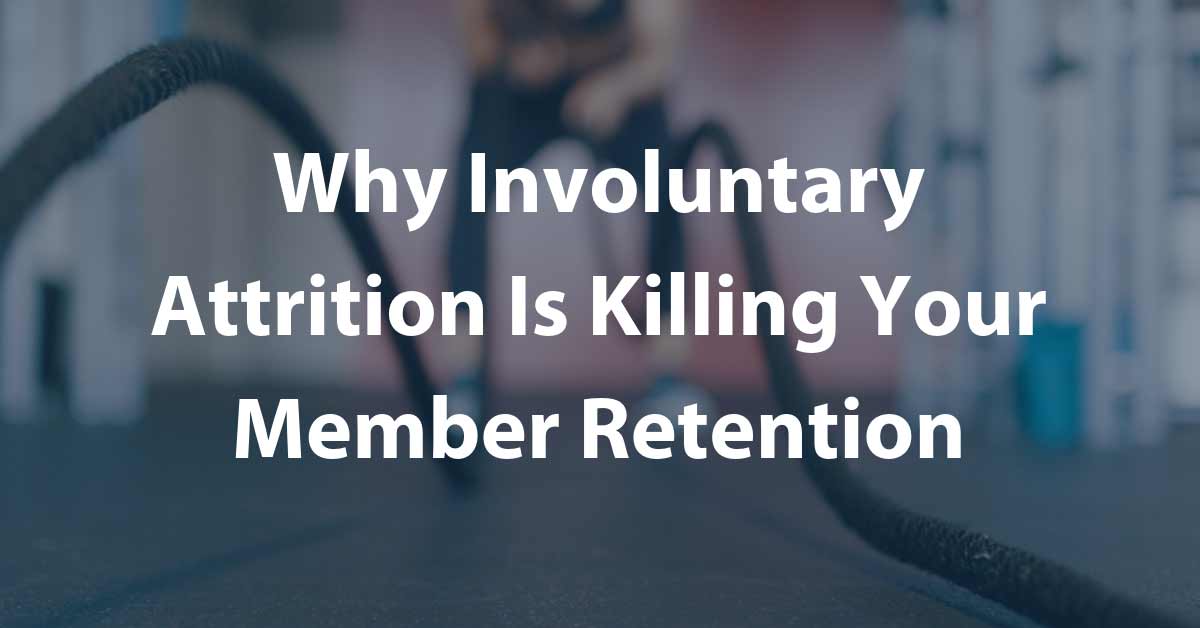When you’re losing the battle for customer retention, it’s impossible to ignore. Complaints and painful cancellations show a clear problem. But what about when content customers disappear without notice?
While on the surface it seems like your customer retention is rock solid, a silent killer may be lurking. Due to failed, expired, or delinquent credit cards, you may lose customers without knowing to a phenomenon called involuntary attrition.
In this article, we’ll take a closer look at involuntary attrition, its impact on your business, and how you can prevent these needless cancellations.
What is Involuntary Attrition?
Involuntary attrition occurs when memberships or subscriptions are automatically cancelled due to failed payments. On average, 15% of recurring credit card payments decline. Some industries experience more than a 30% decline rate. When these payments fail, they are rarely retried. The delinquency goes unnoticed and ultimately results in a lost customer.

Causes of Involuntary Attrition
To fight involuntary attrition, you must understand and address each of its underlying causes.
Credit card expiration
Credit cards expire about every three years. That means that about one-third of your customers will need updated payment information every year. If you don’t have a system for keeping credit card data up-to-date, you risk losing a significant amount of revenue and customers.
Credit card declines
Credit cards can decline for over 130 reasons. The most common reasons for credit card decline include credit limits, suspected fraud, late payments, and deactivation. Even when consumers are notified of declines, they may not remember to update their payment information with your business. Relying on customers alone to troubleshoot declines will result in missed payments and unwanted cancellations.
Delinquency
While many software platforms offer robust and reliable recurring billing, many still lack the features to handle delinquent accounts properly. Most software will not automatically retry a payment after it is declined. Likewise, automatic payment reminders via email and text message can help to prevent missed payments—but they do little to correct the situation once an account is delinquent.
If ignored, delinquent accounts can turn into lost customers. Software helps streamline recurring payments. However, solving delinquency requires you to employ staff to review accounts and work with customers to resolve issues.
How Involuntary Cancellations Impact Your Business
Although other business challenges often overshadow involuntary attrition, it can do significant damage to your finances and customer relationships.
Lost revenue
The most obvious result of involuntary attrition is lost revenue. With each needless cancellation, you lose money not only in the current month but every subsequent month that the customer would have stayed.
Losing money in the first month stings, but losing money every month afterward crushes your bottom line. This long-term multiplier effect means you must replace the lost customer with a new one if you want to make up for the missing income. This puts additional strain on your business because it requires more time and resources to obtain a new customer than keep an existing one.
Damaged relationships
Generally, cancellations come from your least engaged and lowest-quality customers. Involuntary attrition, on the other hand, can impact any customer. For example, a gym member who attends regularly may come back from vacation to find that his or her membership was cancelled due to an expired credit card. In some cases, this member is locked out of the facility and unable to access their workout history and progress.
Similarly, a SaaS client who lets a subscription lapse unintentionally is likely to panic upon realizing they’ve lost their history with the application or can’t access critical data.
Of course, involuntary attrition may not be permanent. Your best customers are more likely to notice the error and re-up their subscriptions. However, the experience is unpleasant and may damage your relationships. As a business owner, it’s your responsibility to safeguard your relationships with customers—especially your financial interactions with them.
A shrinking community
In some industries, involuntary attrition accounts for 20-40% of total attrition. This means that one out of every five cancellations is unnecessary and avoidable.
The loss of customers has a compounding effect on your business. The smaller your community becomes, the less likely you are to benefit from word-of-mouth marketing and referrals.
Limited growth
If you’re constantly fighting attrition, it’s difficult to grow your net profit. The combined challenges of lost revenue, damaged relationships, and a shrinking community will limit your potential for growth in the short and long term.

How to Stop Involuntary Attrition
Despite its devastating impact, involuntary attrition is relatively easy to fix. Because these customers (generally) want to stay a part of your community, you don’t have to change your product, pricing, or staff.
To end involuntary cancellations, you need to make the billing process seamless and keep customers’ payment methods up-to-date. Below are some of the strategies that we include in our payment recovery service to reduce involuntary cancellations:
1) Update credit card information
Keep payment information current to avoid losing customers to expired cards. Our team follows up immediately to get updated credit card information and to collect outstanding payments.
2) Communicate with members about missed payments
Catching overdue payments before they lead to involuntary attrition requires speed, skill, and determination. You need to follow up immediately, give customers multiple chances to resolve the issue, and phrase your request in the right way to make them act. With Cubiic, we handle the scripts as well as reach out to your customers to resolve payment issues quickly and effectively.
3) Offer convenient payment methods
Often, customers will proactively manage payments if given the opportunity. Our system allows customers to make a payment or update payment methods 24/7 through an online payment portal or by phone.
4) Provide billing-related customer service
Your customers’ needs are not limited to questions about how to use your product or service. Maintaining a healthy financial relationship with customers requires effort, too.
The Cubiic customer service team is trained to respond to the unique financial needs of your customers. They practice responding to customers’ concerns about payments, personal financial challenges, and data security. The additional support strengthens relationships and makes cusotmers less likely to be lost to involuntary attrition.
5) Track overdue payments closely
Stay ahead of involuntary attrition by constantly tracking a list of delinquent accounts and past-due invoices. To make things easy, we track missing payments for you. All you need to do is check reports on collected payments, accounts receivable, and active customers periodically.
Winning the War for Customer Retention
Customer retention is the key to your increased profitability and long-term growth. You can stop needless cancellation and build a strong community by learning to recognize the causes and signs of involuntary attrition. Through a payment recovery system and superior customer service, you can boost revenue and provide a better customer experience.
Want to eliminate the threat of involuntary attrition? Get a demo of our payment recovery and collection services.

